
War memorials were erected in many towns of Queensland, Australia, in commemoration of the service and death of many Queenslanders in World War I.

War memorials were erected in many towns of Queensland, Australia, in commemoration of the service and death of many Queenslanders in World War I.
Queensland had few civic monuments before the First World War. The memorials erected in its wake became our most significant monuments, recording the devastating impact of the war on a young Queensland. Over 58,000 Queenslanders served in World War I and over 10,000 of them died. [1] No previous or subsequent war has made such an impact on Queensland. [2]
Even before the end of the war, memorials became a spontaneous and highly visible expression of national grief. To those who erected them, they were as sacred as grave sites, substitute graves for the Australians whose bodies lay in battlefield cemeteries in Europe and the Middle East. British policy decreed that the Empire war dead were to be buried where they fell. The word "cenotaph", commonly applied to war memorials at the time, literally means "empty tomb". [2]
Australian war memorials are distinctive in that often they commemorate not only the dead but all who served. Australians were proud that their first great national army, unlike other belligerent armies, was composed entirely of volunteers, men worthy of honour whether or not they made the supreme sacrifice. Many memorials honour all who served from a locality, not just the dead, providing valuable evidence of community involvement in the war. Such evidence is not readily obtainable from military records, or from state or national listings, where names are categorised alphabetically or by military unit. [2]
War memorials are also valuable evidence of imperial and national loyalties, at the time, not seen as conflicting. They also demonstrate the skills of local stonemasons, metalworkers and architects, and provide insights into popular taste. [2]

Although there are many different types of memorials in Queensland, the digger (soldier) statue is the most common. It was the most popular choice of communities responsible for erecting the memorials, embodying the ANZAC Spirit and representing the qualities of the ideal Australian: loyalty, courage, youth, innocence and masculinity. The digger was a phenomenon peculiar to Queensland, perhaps due to the fact that other states had followed Britain's lead and established Advisory Boards made up of architects and artists, prior to the erection of war memorials. The digger statue was not highly regarded by artists and architects who were involved in the design of relatively few Queensland memorials. In southern states, the obelisk style of war memorial predominates. [2]
The early war memorials were often placed in cemeteries, often being erected to commemorate the death of individual soldiers, e.g. Queensland's first World War I memorial was the Victor Denton War Memorial erected in 1915 in the cemetery at Nobby. [3] However, as the casualties mounted, grief was no longer limited to the close circles of family and friends but to whole communities, resulting in memorials placed in prominent public places in the town, often as part of larger commemorative schemes, such as memorial parks and memorial halls. [4]

Most statues were constructed by local masonry firms, although some were by artists or imported. [2] The statue for the Howard War Memorial was imported from Italy and is unique because the "digger" depicted is not an Australian soldier. Careful inspection reveals the statue has a full Italian Alpino uniform and accoutrements, including badges. [5]
Many of the First World War monuments have been updated to record local involvement in later conflicts, and some have fallen victim to unsympathetic re-location and repair. [2]

Cooyar War Memorial is a heritage-listed war memorial in Hack Menkins Park, McDougall Street, Cooyar, Toowoomba Region, Queensland, Australia. The memorial was unveiled on Saturday 14 July 1923 by Arthur Edward Moore. It was designed and produced by R. C. Ziegler and Son and cost £413/10/0, with funds raised by public subscriptions and revenue raised from entertainments. The memorial comprises two pieces, the pedestal surmounted by a digger statue, on which the names of the 25 fallen are recorded, and a smaller plinth which records the names of the 110 local men who served in World War I. It was added to the Queensland Heritage Register on 21 October 1992.

Goombungee War Memorial is a heritage-listed memorial at Hartwig Street, Goombungee, Toowoomba Region, Queensland, Australia. It was built in 1920 by R C Ziegler and Son. The architect was Harry Marks. It was added to the Queensland Heritage Register on 21 October 1992.
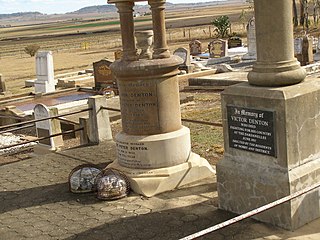
Victor Denton War Memorial is a heritage-listed memorial at Nobby Cemetery, Nobby, Toowoomba Region, Queensland, Australia. It was made in 1915 by Bruce Brothers. It was added to the Queensland Heritage Register on 21 October 1992.

Westbrook War Memorial is a heritage-listed memorial at 114 Toowoomba Road, Westbrook, Toowoomba Region, Queensland, Australia. It was constructed in 1922 by Toowoomba masonry firm Bruce Brothers, and lies adjacent to the Westbrook Public Hall, which it predates. It stands 4.2 metres (14 ft) high, and consists of a statue of a digger atop a sandstone pedestal and base. The memorial contains the names of the 10 local men who died during World War I on the front face, and the 37 who served on the side faces. It was added to the Queensland Heritage Register on 21 October 1992.

Boer War Memorial is a heritage-listed war memorial at Crescent Street, Gatton, Queensland, Australia. It was designed by William Hodgen and produced by Toowoomba mason William Bruce. It was built in 1908, and was unveiled on 3 August by Governor of Queensland, Lord Chelmsford. The memorial honours four local men who died in or as a result of the war, and is one of only three known Boer War memorials in Queensland. It is also known as the Fallen Soldiers Memorial and the South African War Memorial.

Ma Ma Creek War Memorial is a heritage-listed memorial on the Gatton-Clifton Road, Ma Ma Creek, Queensland, Australia. It was completed in 1920. It was added to the Queensland Heritage Register on 21 October 1992.

Beaudesert War Memorial is a heritage-listed memorial at William Street, Beaudesert, Queensland, Australia. It was built from 1919 to 1921. It was added to the Queensland Heritage Register on 21 October 1992.
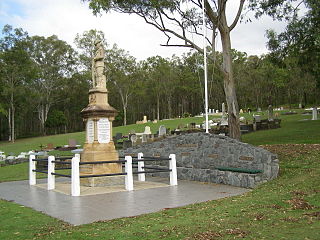
Pimpama & Ormeau War Memorial is a heritage-listed memorial at Pacific Highway, Pimpama, Queensland, Australia. It was built in 1919. It was added to the Queensland Heritage Register on 21 October 1992.
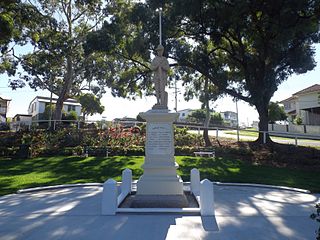
Manly War Memorial is a heritage-listed memorial at 184 Carlton Terrace, Manly, City of Brisbane, Queensland, Australia. It was built from 1920 to 1921. It is also known as Ferguson Street Reserve, Manly Dam, and Soldiers Memorial Park. It was added to the Queensland Heritage Register on 21 August 1992.

Oxley War Memorial is a heritage-listed memorial at 1218 Oxley Road, Oxley, Queensland, Australia. It was built in 1920. It is also known as Oxley Memorial Park and Oxley Place. It was added to the Queensland Heritage Register on 4 July 2006.

Ipswich Railway Workshops War Memorial is a heritage-listed memorial at the North Ipswich Railway Workshops, North Street, North Ipswich, City of Ipswich, Queensland, Australia. It was designed by Vincent Price and built in 1919. It was added to the Queensland Heritage Register on 21 October 1992.

Brooweena War Memorial is a heritage-listed memorial at Smith Crescent, Brooweena, Fraser Coast Region, Queensland, Australia. It was built in 1922 by F W Webb. It was added to the Queensland Heritage Register on 21 October 1992.

Howard War Memorial is a heritage-listed memorial at William Street, Howard, Fraser Coast Region, Queensland, Australia. It was built in 1921. It was added to the Queensland Heritage Register on 21 October 1992.

Bundaberg War Memorial is a heritage-listed memorial at Bourbong Street, Bundaberg Central, Bundaberg, Bundaberg Region, Queensland, Australia. It was designed by Frederic Herbert Faircloth and built from 1920 to 1921 by Anselm & Odling (Sydney). It was added to the Queensland Heritage Register on 21 October 1992.

Finch Hatton War Memorial is a heritage-listed memorial at Anzac Parade, Finch Hatton, Mackay Region, Queensland, Australia. It was designed by Melrose & Fenwick and built in 1921 by Melrose & Fenwick. It was added to the Queensland Heritage Register on 21 October 1992.

Sarina War Memorial is a heritage-listed memorial at Broad Street, Sarina, Mackay Region, Queensland, Australia. It was built in 1919 by Melrose and Fenwick. It was added to the Queensland Heritage Register on 5 December 1997.
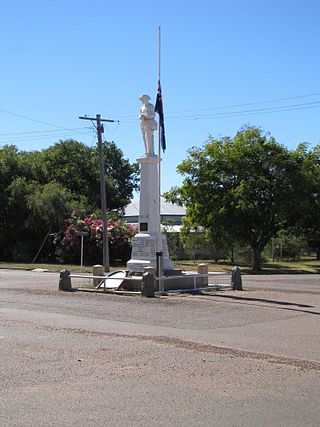
Aramac War Memorial is a heritage-listed memorial at Lodge Street, Aramac, Barcaldine Region, Queensland, Australia. It was designed and built by F M Allan in 1924. It was added to the Queensland Heritage Register on 21 October 1992.

Atherton War Memorial is a heritage-listed memorial at Kennedy Highway, Atherton, Tablelands Region, Queensland, Australia. It was built in 1924. It was added to the Queensland Heritage Register on 21 October 1992.
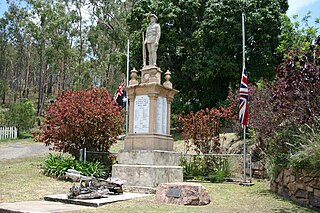
Herberton War Memorial is a heritage-listed memorial at Myers Street, Herberton, Tablelands Region, Queensland, Australia. It was designed and built by Andrew Lang Petrie and Son in 1922. It was added to the Queensland Heritage Register on 21 October 1992.

Dalby War Memorial and Gates is a heritage-listed memorial at Patrick Street, Dalby, Western Downs Region, Queensland, Australia. It was designed and built in 1922 by Harry Shill and British firms. It was added to the Queensland Heritage Register on 21 October 1992.
This Wikipedia article was originally based on "The Queensland heritage register" published by the State of Queensland under CC-BY 3.0 AU licence (accessed on 7 July 2014, archived on 8 October 2014).